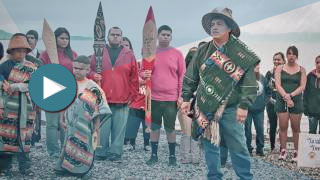Lessons from Tribes
Tribal health practices and traditions offer valuable lessons for the field of public health. When working with tribal partners, remember that learning and expertise can flow in both directions.
Integrated Concepts of Health
Traditional tribal health beliefs have important lessons for public health and Western medicine. Although health beliefs vary among tribal members, a common factor is an understanding of health as the product of many interrelated factors, including the mind, body, spirit, community, and environment.
This holistic view is in contrast to the United States’ mainstream health system, which tends to treat health issues one by one, rather than as part of an integrated whole. But public health and health care are beginning to catch up to this ancient tribal wisdom. Health care initiatives like the Nuka System of Care at Southcentral foundation and public health frameworks such as social-ecological models reflect a growing recognition that complex health challenges need to be approached holistically.
Learn more about tribal concepts of health:
- Galloway, James and Goldberg, Bruce W. Primary Care of Native American Patients: Diagnosis, Therapy, and Epidemiology. Boston: Butterworth Heinemann, 1999.
- Hultkrantz, Ake. Shamanistic Ritual and Ritual Drama: Health and Medicine in Native North American Religious Traditions. New York, New York: Crossroads Publishing Co., 1992.
Health Workforce Innovations
Tribes are often innovators in public health and health care delivery models, implementing new approaches that can also work in non-tribal communities, particularly in rural areas. For example, tribes in Alaska and Washington found a way to improve oral health in their communities by training, licensing, and employing dental health aide therapists, who can perform many of the routine procedures normally performed by dentists. This has allowed access to dental health care in areas where dentists are scarce. In Alaska, a community health aide program fulfills a similar role for medical and behavioral health needs in rural communities. While restrictive licensing requirements sometimes pose a challenge for implementing similar programs in non-tribal jurisdictions, the tribal innovations present a powerful case study that can be used to adapt the programs to comply with local laws or to advocate for legal changes.
Learn more:
- Article from Native News Online on Swinomish Tribe using Dental Therapists to Address Oral Health Crisis
- IHS Community Health Aide Program Expansion
Environmental Expertise and Advocacy
“Food sovereignty is the right of peoples to healthy and culturally appropriate food produced through ecologically sound and sustainable methods, and their right to define their own food and agriculture systems. It puts the aspirations and needs of those who produce, distribute and consume food at the heart of food systems and policies rather than the demands of markets and corporations.”—Declaration of Nyéléni, the first global forum on food sovereignty, Mali, 2
Tribes are often important leaders in making the case for the health and human aspects of environmental protection as well as the importance of communities harnessing local, natural resources both for health and sustainability.
For example, recognizing the disconnect between the abundant natural resources available in the Klamath Basin in Southern Oregon and the rampant health issues related to food insecurity and diet amongst local communities, tribal members from the Klamath, Karuk and Yurok Tribes worked with the University of California, Berkley to promote traditional land management techniques and increase the availability of local, culturally appropriate foods. 47
The project recognized that traditional knowledge systems and natural resources could be leveraged to promote health amongst tribal members and the larger community, create a more sustainable food system, and improve the management of forests and land.
Tribes have also had to fight to protect natural resources, protect habitats for endangered species, and to maintain areas of significance for AI/AN people, such as sacred sites and traditional hunting or fishing areas.
In 2015, the Lummi Nation placed their treaty rights on the line by formally opposing the building of a coal terminal off the coast of Washington State. The terminal, which was expected to bring in an additional 500 large tanker ships to the Salish Sea every year, 16 was planned for a site that was the habitat for a number of fish and shellfish central to the Lummi Nation’s way of life and vital to the aquatic environment.
You can learn more about the Lummi Nation’s fight against the coal terminal in the Northwest Treaty Tribes’ documentary, Not for Any Price.
Learn more about how Northwest tribes work directly with the Environmental Protection Agency, in an example of a federal-tribal partnership.
Learn about Northwest traditional ecological knowledge and how it can shape health and environmental policy.
Learn more about the environmental public health services performed by an IHS division based in Portland, OR.


